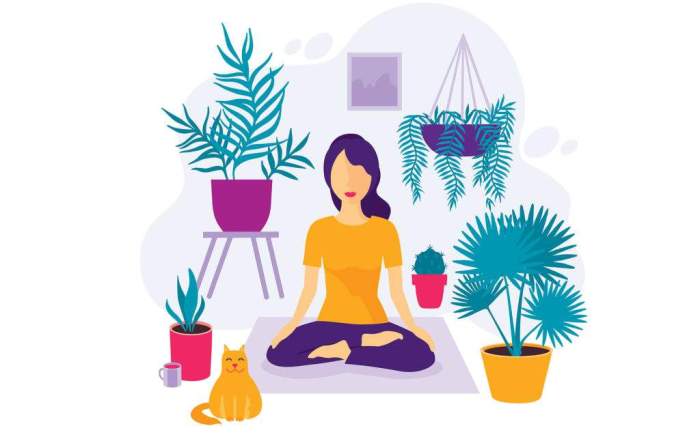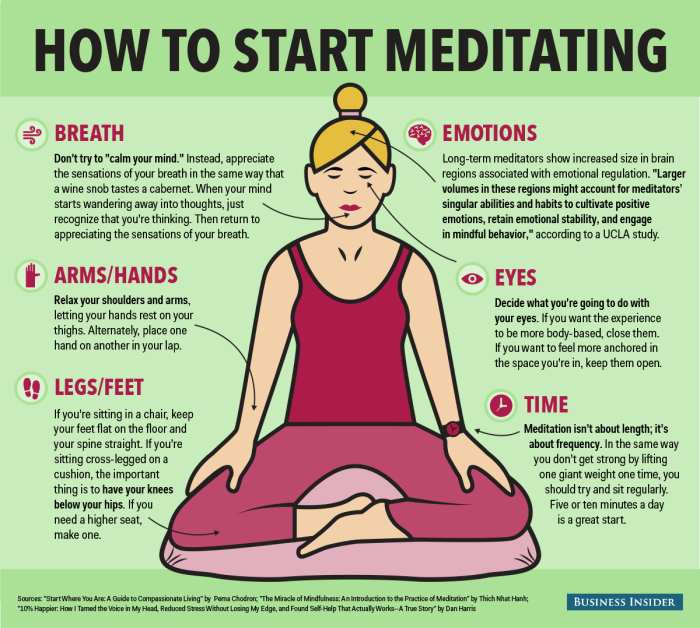How to Meditate for Creating a Balanced Life opens the door to a journey of inner peace and harmony through mindfulness and self-awareness.
Exploring different meditation techniques, creating a serene meditation space, and integrating meditation into daily routines are key aspects discussed in this guide.
Introduction to Meditation for Balance

Meditation is a practice that involves focusing the mind and eliminating distractions to achieve a state of clarity and inner peace. When done regularly, meditation can help create a balanced life by promoting overall well-being and harmony.
Are you looking to enhance your mental clarity and insight through meditation? Check out this comprehensive guide on How to Meditate for Building Mental Clarity and Insight that provides practical tips and techniques to help you achieve a sharper mind and deeper understanding.
Benefits of Incorporating Meditation into Daily Routines
- Reduced stress and anxiety levels
- Improved concentration and focus
- Enhanced self-awareness and emotional intelligence
- Promotes better sleep and relaxation
How Meditation Helps in Achieving Mental and Emotional Equilibrium
Meditation can help in achieving mental and emotional equilibrium by allowing individuals to observe their thoughts and emotions without judgment. This practice helps in developing a sense of inner calm and resilience, enabling individuals to respond to life’s challenges with clarity and composure.
Types of Meditation Techniques

Meditation encompasses a variety of techniques that can help individuals achieve balance in their lives. Two popular types of meditation techniques that are known for promoting balance are mindfulness meditation and loving-kindness meditation.
Did you know that you can meditate with your eyes open? Explore the innovative techniques outlined in How to Meditate with Eyes Open: 5 Easy Ways to experience mindfulness and focus while keeping your eyes wide open. Discover a new way to meditate and deepen your practice.
Mindfulness Meditation for Mental Clarity
Mindfulness meditation involves focusing on the present moment without judgment, allowing individuals to cultivate awareness and clarity in their minds. By paying attention to thoughts, emotions, and sensations as they arise, practitioners can develop a deeper understanding of themselves and their surroundings. This practice is particularly effective in reducing stress, anxiety, and enhancing mental well-being.
For those seeking to develop emotional resilience, meditation can be a powerful tool. Learn how to cultivate inner strength and emotional stability with the help of How to Meditate for Developing Emotional Resilience. Discover effective practices that can help you navigate through life’s challenges with grace and composure.
Loving-Kindness Meditation for Emotional Balance
Loving-kindness meditation, also known as Metta meditation, involves sending well-wishes and compassion to oneself and others. This practice aims to cultivate feelings of love, kindness, and empathy towards oneself and the world around us. By fostering positive emotions and connections, loving-kindness meditation helps individuals develop emotional balance, improve relationships, and enhance overall well-being.
Creating a Meditation Space

Creating a designated meditation space in your home can greatly enhance the quality of your practice and help you achieve a deeper sense of peace and balance in life.
Tips for Designing a Calming Meditation Space
Creating a serene meditation space involves thoughtful design and careful attention to detail. Here are some tips to help you create the perfect environment for your practice:
- Choose a quiet corner or room in your home where you can meditate without distractions.
- Decorate the space with calming colors like soft blues, greens, or neutrals to promote relaxation.
- Add elements of nature such as plants or natural materials to create a sense of tranquility.
- Use cushions, yoga mats, or comfortable chairs to create a cozy and inviting seating area.
Importance of a Dedicated Meditation Area
Having a dedicated space for meditation helps signal to your mind and body that it’s time to relax and focus. This separation from your everyday surroundings can make it easier to transition into a meditative state and deepen your practice.
Incorporating Elements for a Soothing Meditation Space
To enhance the ambiance of your meditation space, consider incorporating elements like:
- Candles or incense to create a calming atmosphere and engage the senses.
- Soft lighting or natural sunlight to promote a sense of openness and clarity.
- Soothing music or nature sounds to help drown out external noise and aid in relaxation.
- Inspirational quotes or artwork to cultivate a positive and mindful mindset during your practice.
Incorporating Meditation into Daily Routine: How To Meditate For Creating A Balanced Life

Integrating meditation into your daily routine can help you maintain balance and promote overall well-being. Here are some suggestions on how to seamlessly incorporate meditation into a busy schedule:
Ideal Times for Meditation Practice, How to Meditate for Creating a Balanced Life
- Early Morning: Starting your day with meditation can set a positive tone and help you stay centered throughout the day.
- Midday Break: Taking a few minutes to meditate during your lunch break can help you recharge and refocus for the rest of the day.
- Evening: Ending your day with meditation can help you unwind, relax, and prepare for a restful night’s sleep.
Strategies for Consistent Meditation Practice
- Set a Schedule: Choose specific times each day to meditate and make it a non-negotiable part of your routine.
- Start Small: Begin with short meditation sessions, gradually increasing the duration as you become more comfortable with the practice.
- Create Reminders: Use alarms, notifications, or visual cues to prompt you to meditate at your chosen times.
- Combine with Daily Activities: Pair meditation with existing habits like brushing your teeth or drinking your morning coffee to make it easier to remember.
- Be Flexible: If you miss a session, don’t be too hard on yourself. Simply resume your practice the next day without judgment.
Benefits of Meditation for Balance

Meditation offers a wide range of benefits that contribute to creating a balanced life. It can have a positive impact on both physical and psychological well-being, ultimately leading to improved relationships and overall quality of life.
Physical Benefits
- Reduction of stress: Meditation helps lower cortisol levels, the hormone associated with stress, leading to a more relaxed state of mind and body.
- Improved sleep: By calming the mind and reducing anxiety, meditation can promote better sleep quality and help alleviate insomnia.
- Enhanced immune function: Regular meditation practice has been linked to a stronger immune system, providing better protection against illnesses.
Psychological Benefits
- Increased self-awareness: Meditation allows individuals to observe their thoughts and emotions without judgment, leading to a deeper understanding of oneself.
- Emotional resilience: Through mindfulness practices, individuals can develop the ability to respond to challenges with clarity and composure, enhancing emotional resilience.
- Reduced symptoms of anxiety and depression: Studies have shown that meditation can help alleviate symptoms of anxiety and depression by promoting a sense of calm and well-being.
Impact on Relationships and Well-being
- Improved relationships: By cultivating a sense of compassion and empathy through meditation, individuals can enhance their relationships with others, fostering deeper connections.
- Enhanced overall well-being: A balanced life achieved through regular meditation practice can lead to greater happiness, contentment, and a sense of fulfillment in life.
Embrace the transformative power of meditation and embark on a path towards a more balanced and harmonious life.